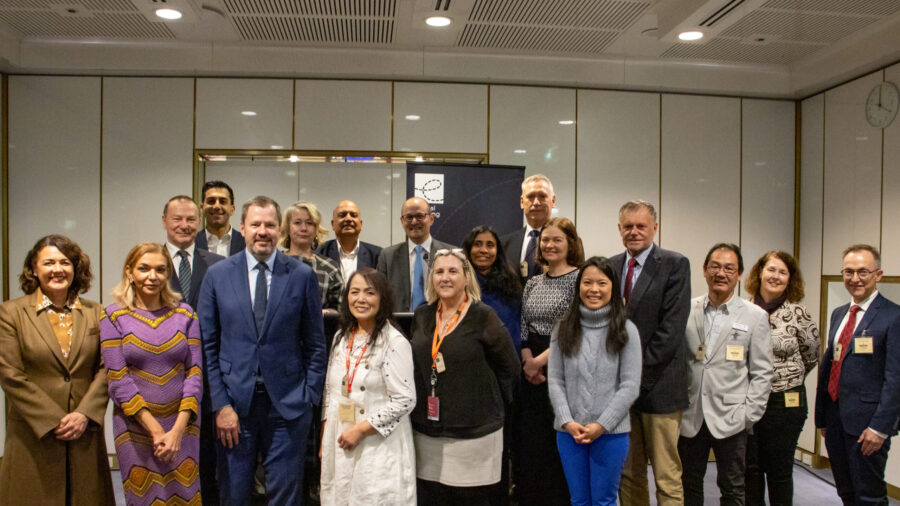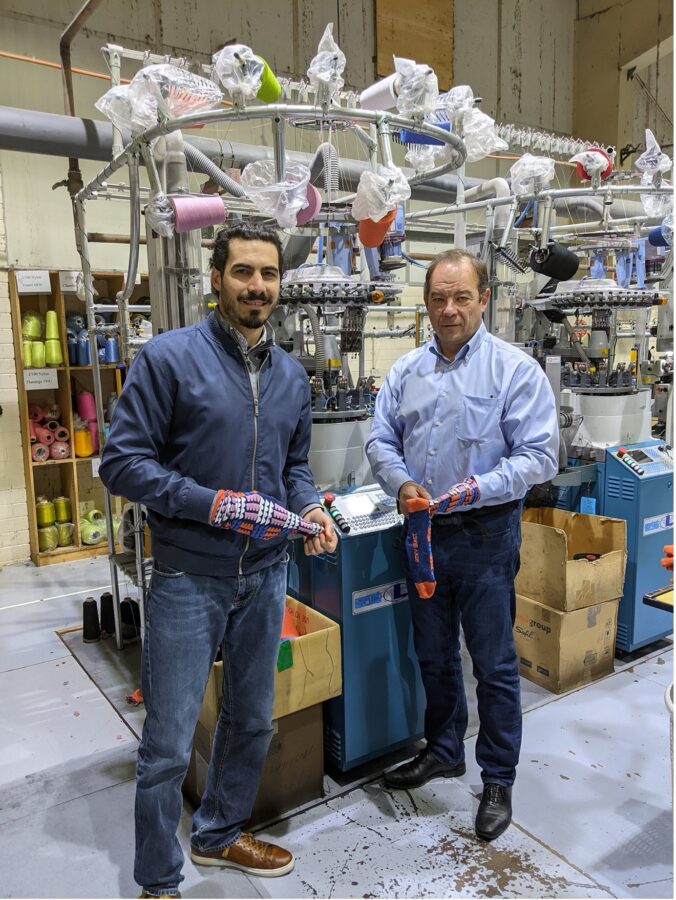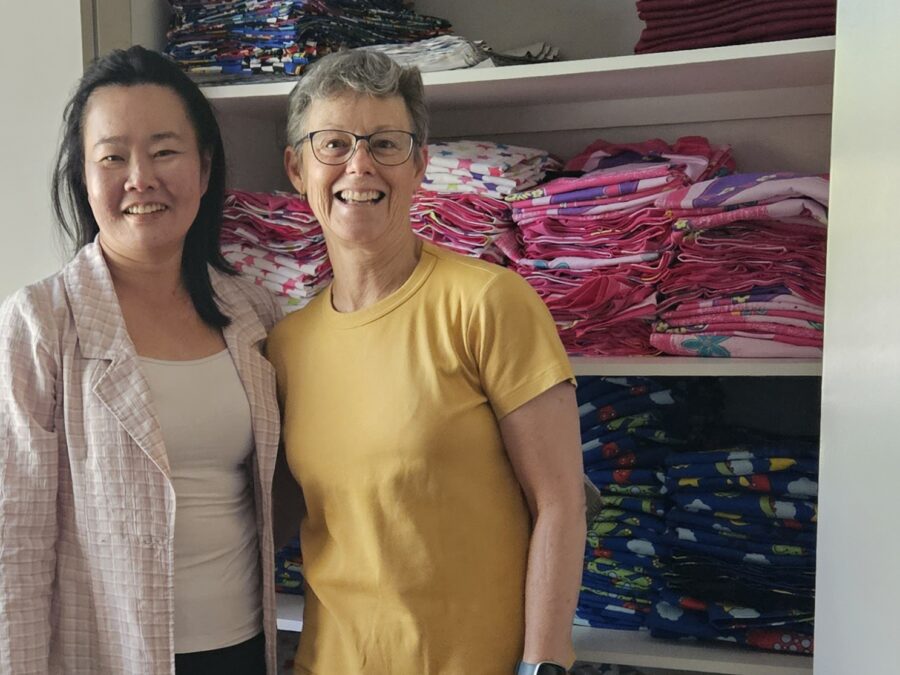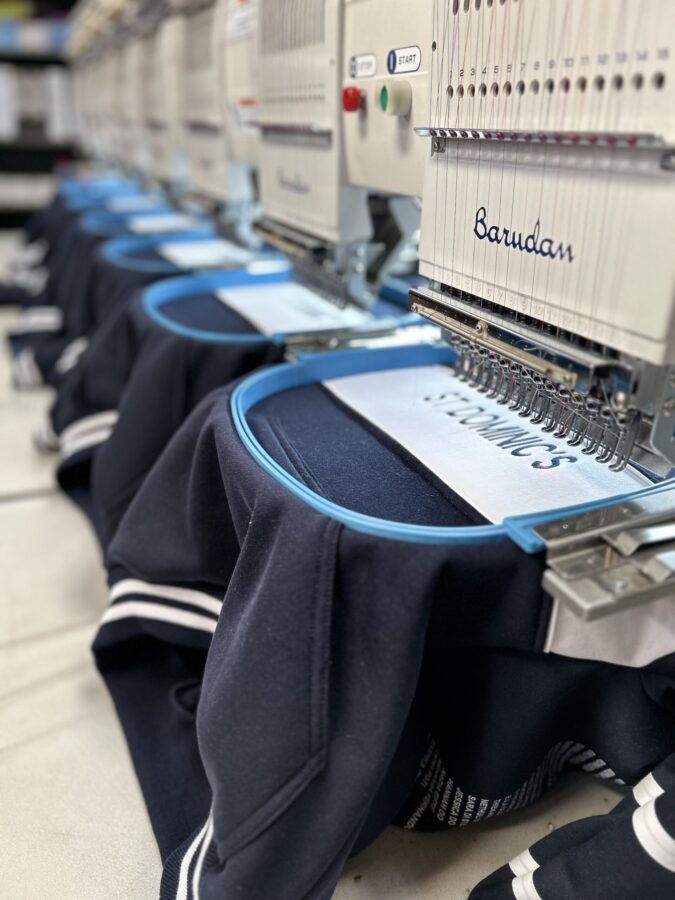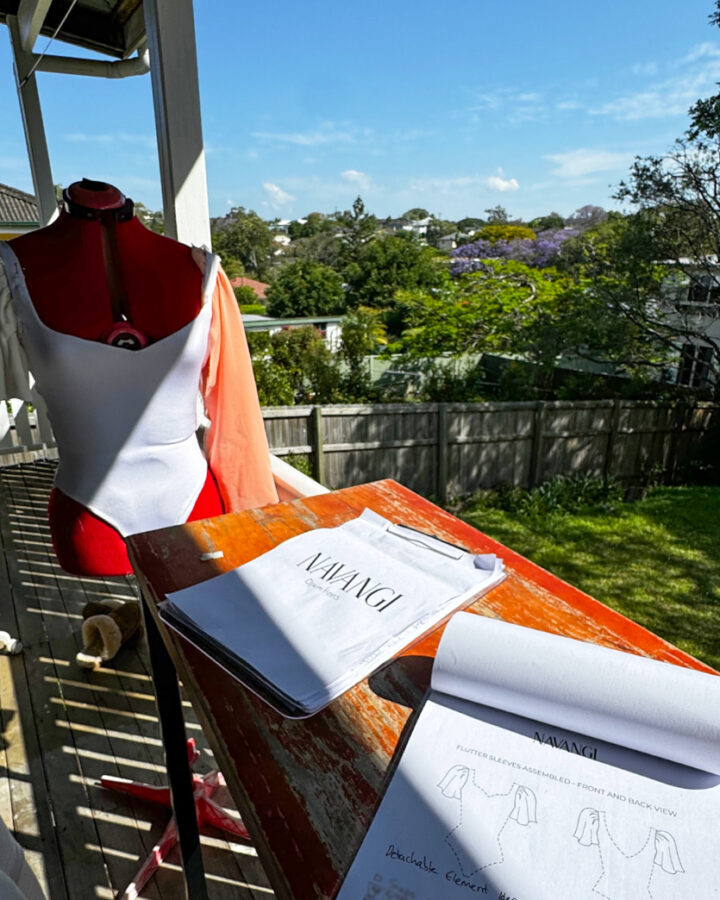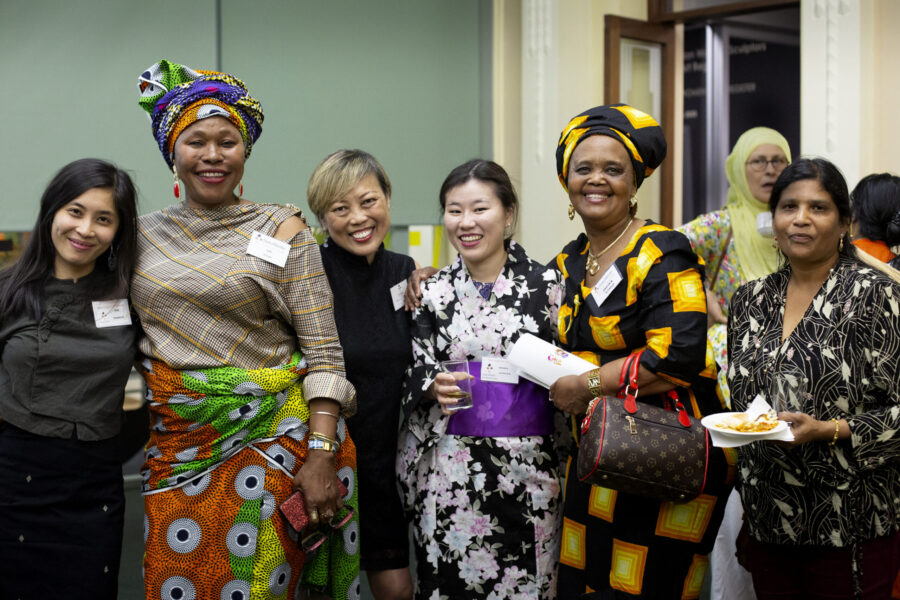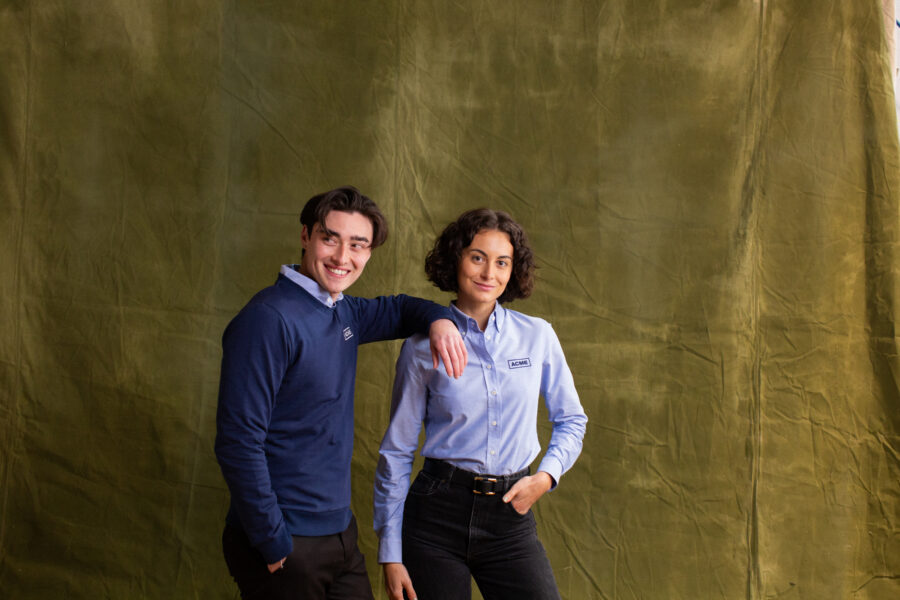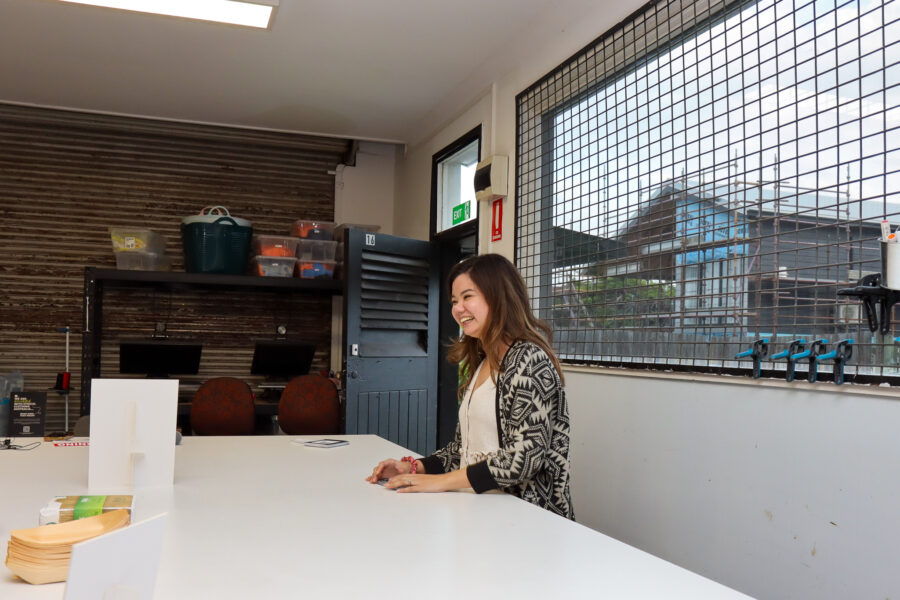Generation Women x Ethical Clothing Australia
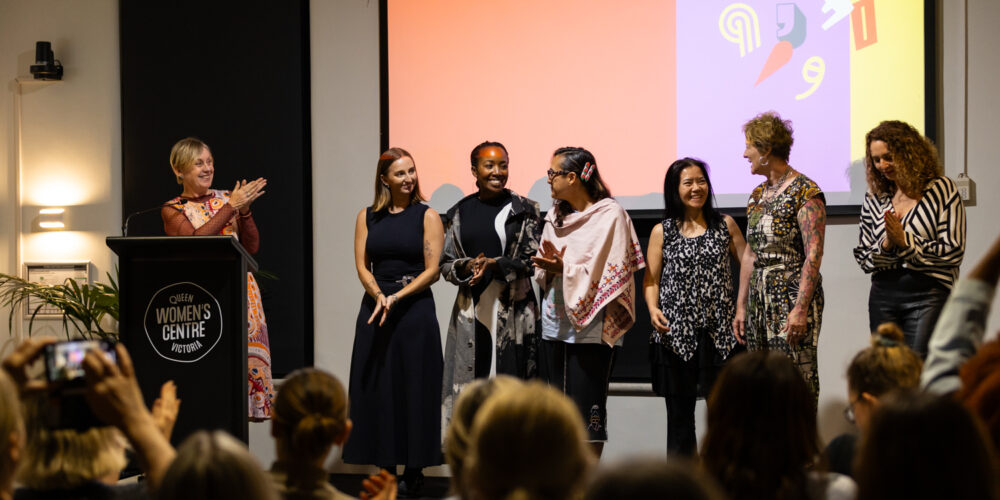
Event
The First Stitch: Stories of resilience, sewing and strength
Globally and locally, the textile, clothing and footwear (TCF) industry is deeply gendered, with approximately 77% of the Australian TCF workforce identifying as female. It’s a space where you’ll find extraordinary women everywhere you look – from the highly skilled sewing technicians on the factory floor to innovative entrepreneurs running their own businesses. It’s also an industry in which women are overrepresented in issues, including poor working conditions, exploitation and unequal pay.Recognising the gendered nature of the industry, Ethical Clothing Australia launched the Victorian Women’s Leadership Network – an industry first in Australia. Since it launched on International Women’s Day 2024, the network has provided support, connection and mentoring to numerous women engaged with Ethical Clothing Australia – either as an accredited business, union representative or outworker.
To close our first year as a network, we partnered with Generation Women – a monthly storytelling event – for ‘The First Stitch: My Life in the Textile, Clothing and Footwear Industry,’ held at the beautiful Queen Victoria Women’s Centre.
Guests at “The First Stitch: My Life in the Textile, Clothing and Footwear Industry,” presented by Generation Women and Ethical Clothing Australia at the Queen Victoria Women’s Centre. Above: MC Rebecca Lister welcomes guests.
All photos by Renee Coster for Generation Women.
As MC Rebecca Lister welcomed the audience to the event, she said:
“Tonight, you’ll hear from women who have been part of the history of Australia’s TCF industry, and you’ll hear from women who are helping to shape its future. The thread that ties these six speakers together is that they all believe wholeheartedly in ethical manufacturing – protecting the people who make our clothes and ensuring they are paid fairly, treated with dignity and that they are safe at work. That’s something to celebrate.”
With our shared commitment of elevating and advocating for the voices of women, we hope this will be the first of many collaborations between Generation Women and Ethical Clothing Australia. In the meantime, read some of the powerful stories shared by speakers on the night.
``I didn’t want to work for a company that produced fast fashion.``
Team 20s: Rachel Humphreys
Product developer and pattern maker at Sample Room
Rachel Humphreys works at an ethically accredited product development house, Sample Room. Her days consist of pattern making, production and sample cutting, and liaising with a broad range of clients through fittings and design meetings.
A self-confessed “crafty creative” who loves to sew and keep her hands busy, Rachel said that the fashion industry always resonated strongly with her. After finishing her fashion design degree at university, Rachel felt passionately that she wanted to work for a business that reflected her ethical values and allowed her to work in the hands-on making and creating aspects of the TCF industry.
With a smile, she shared that, while she applied for many jobs, she only heard back from one: Melbourne’s Sample Room, who offered her her first job in the industry.I was on the hunt for my first ‘big girl job’, but I had some rules for myself. Feeling secure and proud in and of my workplace was really important to me. I didn’t want to work for a company that produced fast fashion. I didn’t want to work for a company that had a negative culture. I didn’t want to work for a company that didn’t inspire me. But more than anything, I didn’t want to work for a company that didn’t hold the same values I hold. Some may say I was being picky, but I think it was worth it.
— Rachel Humphreys, Product developer and pattern maker at Sample Room
Now nearly three years into the role, Rachel reflected that she can sometimes experience the push and pull that many feel at the start of their careers.
“As I’m sure all young people around my age do, it’s hard to not compare yourself to others of similar age working in the same field… feelings of ‘they’re doing it all, why haven’t I pushed myself to do that too?’ And ‘should I have tried to go out, start my own brand, and fulfil my childhood dream job of [becoming a] fashion designer?”
However, she says the experience and support she’s gained in her manufacturing role where she’s “learnt more in 3 months in the industry than in 3 years of studying” brings its own sense of creative joy and success.
“Although I’m not working on my ideas, my design concepts or my brand visions in my job, knowing that I am a key factor in helping someone to achieve their vision through my knowledge and skill is really rewarding. I feel I am being creative, and in a way, I believe translating a sketch into a pattern to be a final product is designing. It’s technical, at times can be very challenging and it is definitely fulfilling.”
“My ethical accreditation is inclusive now of how I also treat myself as the manufacturer.”
Team 30s: Tamara Leacock
Designer and maker at REMUSE
Tamara Leacock is a designer and stylist who holds ethical production at the heart of everything she does. Originally from Lenapehoking (New York), Tamara now lives in Narrm (Melbourne) where she has launched her contemporary unisex label, REMUSE. She is also a sessional lecturer at Collarts in the Fashion and Sustainability and Fashion Marketing departments.
Opening with an Acknowledgement of Country and a recognition of the power of being in a space that platformed the voices of women and often marginalised people, Tamara offered this initial insight into her own experiences in the TCF industry.
“As a fashion designer, a woman of colour, a black woman and expatriate here in Australia, my journey within Australia’s textile, clothing and footwear industry has been anything but linear or conventional. In this journey, I have faced many challenges that have not only shaped me as a designer and a brand founder, but which have also deeply influenced how I approach my business.”
She went on to share a personal story about a time when incredible opportunities for her label came at the same moment as a life-altering health crisis for her. Taking the audience through her journey of deciding whether to forge ahead with the opportunity even as she recovered from major surgery, Tamara shared the challenges that exist behind the glamour of the industry for many designers.
“Runway shows are exhilarating experiences with the potential to allow brands to reach new audiences far and wide…they create magnetic spaces of connection and mutual appreciation of art among attendees… make the experience of fashion accessible to those who may not otherwise be able to invest in the possession or loaning of a garment.
“However, runway shows can be and are often grueling experiences and costly on the financial and overall health of many at the core of producing them. I survived one runway show in post-operative recovery; who is to say that I could do this again?”
Eventually deciding to participate in the event, but not apply for subsequent opportunities, Tamara shared how this decision was a moment for reckoning and supported her vision for an ethical brand.
“It wasn’t about failure, it was an opportunity to realign with my values and to honour the things that are most important to me: my health, my community and my integrity as an ethical designer.”
Speaking to the importance of her ethical values to her brand, Tamara said this…
“My ethical accreditation is inclusive now of how I also treat myself as the manufacturer of my brand outside of the studio as well. Sustainability now authentically extends to how I am sustaining my energy, my health, and my long-term vision for REMUSE for myself, my clients and my community.”Ethical production isn’t just about being responsible with material procurement or production settings; it is about ensuring fair wages for workers of all genders and identifiers, equalising access to the centers and seats of power and making sure every piece of clothing is made with integrity.
— Tamara Leacock Designer and maker at REMUSE
“How many of you have thought about the person who made your clothes?”
Team 40s: Dewi Cooke
Chief Executive Officer at The Social Studio
Dewi Cooke is the CEO of The Social Studio, a not-for-profit social enterprise providing work and training opportunities in fashion and the creative industries to refugee and new migrant communities.
But in a previous life, Dewi trained and worked as a journalist. As she started her story, she took the audience back to this time – when the stories she covered were mainly about closures of manufacturing.
“It started around 2006 in the automotive industry, with small parts manufacturers like Ajax Fasteners, Venture Industries and Bekaert Australia shutting up shop. And it continued through the years in the textile clothing and footwear industry with redundancies in 2007 at carpet manufacturer Feltex and the closure of Bonds manufacturer Pacific Brands’ factory in 2009,” she shared.
“I spent a lot of this time talking to workers, mostly migrants who spoke of arriving in Melbourne and walking straight into a job on some manufacturing floor and staying there, learning English, making friends and being part of building something greater than themselves. Part of an Australia that made things.”
Dewi was struck by this idea of work connecting us to a place and a community, and that planted the seed for the creation of The Social Studio.
“We train people from refugee and migrant backgrounds to sew, and we also run our own manufacturing workshop where that connection to making real, tangible things – and our connections to each other – is central to how we do our work.”
Dewi asked the audience to consider their own connections: to the clothing they wear and the people who made it.
“I look around this room and we’re all wearing clothes. Clothing is with us all our lives. So why has something so integral to how we live become so devalued? Is it because the distance between us and those who make things is now too great, too obscured, that we don’t connect the human to the material anymore?”
Continuing with this gentle provocation, she asked the audience to think about the person who made their clothes.
Dewi then took the audience on an imagined tour of The Social Studio, bringing the workshop, school and office space to life for us.Have you thought about what they dream about? What they hope for? Was the factory they were working in big, or small, did they have friends at work, did they eat lunch together, was it a good place to be?
— Dewi Cooke Chief Executive Officer at The Social Studio
“There’s lots of natural light and fresh air, but it can get a bit cold in winter,” she shared.
“In The Social Studio’s manufacturing team, there’s Lois, Cynthia, Irem, Ani, Nyamal and Oksana. Sometimes there’s Loan too. Right now, we’re working on tote bags and next week we’ll probably be working on some stock for our store. Between Monday to Thursday, you’ll see people with their heads down, sewing, or cutting fabric or maybe filling each other in about a child’s birthday party, a new creative project or the best variety of new season mangoes.Our team all have families, friends and lives beyond work. But work is what binds us together. And that bond, that sense of responsibility to one another and to a greater story, is what I hope we can all remember here tonight.”
Dewi encouraged the audience to think about the multitude of impacts that a consumer can have when they choose to support ethical, local manufacturers.
“If you consider yourself someone who’s values-driven, or a feminist, or who cares
about the environment, then tuning in to the breadth and depth of the local manufacturing industry is a no-brainer.”
“Buy something from a locally manufactured brand and you’re probably supporting a woman into work because 77% of workers in the TCF industry in Australia are women.Buy something from a locally manufactured brand and you’re likely reducing transport costs for that garment and therefore the carbon footprint of that piece of clothing. Buy something from a locally manufactured brand and be part of a greater narrative about who we are, what we make and what we value.”
After a brief intermission, the final three speakers took to the stage. While the normal format of a Generation Women event sees one speaker from each decade, 20 to 70, our custom event had three speakers from Team 60 – each of whom had their own unique story to tell that represented the diversity and breadth of the TCF industry.
“Sitting alone in the corner of the garage, working for such long hours, I felt isolated.”
TEAM 60s: Nguyet Nguyen Outworker
Outreach Officer, TCF Union – VIC
Nguyet Nguyen started sewing from a very young age.
“At the age of 14 I took a tailoring course far away from home where I stayed with my auntie. It was the best thing that I did and I managed to complete the course in 12 months. I had my first sewing machine, a secondhand one.”
At the age of 16, Nguyet fled Vietnam as a refugee with her brother and first lived in Holland for eight years after being picked up by the Dutchman ship while they were at sea. Nguyet got married and migrated to Australia with her husband and young daughter in 1987.
A few weeks after settling in Melbourne, she bought sewing machines to work from home and was then an outworker for 22 years.
Speaking honestly and openly, Nguyet shared what she experienced during those 22 years.
“There was no control of wages. Just working hard and long hours. We had no idea that the outworkers have the right to be treated fairly. We were afraid about losing work. We were threatened with harassment to get more work done faster.
“Most of the time I had to hide the work stress from my kids. This was not easy as they soon discovered we had a different lifestyle from their school friends. Once in a school assembly the students were shown a video about outworkers where my daughter recognised people in the video, and only then she started understanding my work situation.”
“Sitting alone in the corner of the garage, working for such long hours, I felt isolated.”
A segment on SBS Radio about the TCF Union encouraged Nguyet to bravely step out of her shell and take a pattern making course at RMIT coordinated by the Union. Subsequently, Nguyet took part with the union in a Senate Hearing on the Textiles, Clothing and Footwear (TCF) Act.
“This was the start of a new journey to make a difference and meeting people in the same situation as me was a great experience,” she told the audience.
Now an Outworker Outreach Officer for the TCF Union, the first outworker in Australia to hold the position – Nguyet works tirelessly to build relationships and trust with outworkers.
She closed her story with a powerful reminder for the audience.
“We all love beautiful clothes, and all the people who make those clothes deserve good working conditions.”
— Nguyet Nguyen Outworker Outreach Officer, TCF Union - VIC
“The time is now if we are going to save our local manufacturing industry.”
TEAM 60s: Edwina Walsh
CEO/Founder Assembled Threads
Clothes have always played a big part in the life of Edwina Walsh, and she has the rag trade running through her veins.
“I am the luckiest person in the world, because I have had a career in an industry I am passionate about,” said Edwina Walsh as she took to the stage to share her story.
“Garments and their creation has been my oxygen.”
The start of her career saw her working for Australian fashion royalty including Adele Palmer and Jag labels – at a time when the local manufacturing industry was booming.
“For me it was heaven. The most exciting, dynamic, creative time. Every part of the garment’s creative process was done in-house. Every part of the garment from the textiles, accessories, adornments to the styling began its life at the tip of a designer’s pen… We were creating metal finishes when the only ones available to the market were nickel and antique brass. Jackets were fully covered in embroidery – when embroidery was usually a small logo design. Fabrics had experimental pigments and inks utilised. And every day, vans would arrive with locally made garments, uploaded onto racks that snaked around the warehouse.”
From there, her successful and staggeringly extensive career across all aspects of the fashion industry in Australia and overseas saw her doing everything, from studying Product Development in New York to flying all over the world as a fashion forecaster.
Then a trip to Nepal to source beanies hand knitted by women exiting situations of sexual exploitation and slavery pointed her in a new direction, igniting Edwina’s interest in how we were utilising the skills of refugees entering Australia with strong manufacturing expertise.
“The Victorian Government had launched their Social Procurement Framework, and a light bulb had gone off – what a game changer this desire for local uniforms could be for local manufacturing in Victoria. Where a once vibrant industry stood 20 years ago, stands an industry facing the cliff.”
Seeing the opportunity to renew the local manufacturing industry through mobilising this workforce, she spent the next 18 months volunteering with not-for-profit organisations and from these learnings and connections, Assembled Threads emerged.
Since their establishment in 2021 as a social enterprise, Assembled Threads has been dedicated to creating meaningful social change and contributing positively to the community. Their mission is centered around providing employment opportunities for people from migrant, refugee and asylum-seeking backgrounds, fostering skills development, and promoting environmental sustainability in uniform procurement.
“Since our creation we have delivered over 33,000 hours of social inclusive training employment and over $875K in wages. We have produced over 22,000 products locally and recycled 964 kg of textile waste,” Edwina shared proudly.
As she closed, Edwina also left the audience with a powerful message.
“The time is now if we are going to save our local manufacturing industry. With only approximately 12% of uniforms being made locally out of the thousands of garments currently imported – we have an incredible opportunity to collaborate with Government and Industry, and turn this into a game-changing strategy for our local industry.
“My dream is to see the innovation and passion that once drove a thriving dynamic local industry, once again make us all proud of the industry we are lucky to call our own.”
— Edwina Walsh CEO/Founder Assembled Threads
``I was not surrounded by strong independent women, which only made me more determined to break free.``
TEAM 60s: Beth Macpherson
National Compliance Officer Textile, Clothing and Footwear Union
Elizabeth Macpherson (Beth) has over 40 years’ experience in the TCF industry, starting her career very early.
“I left school at 14 years of age, which was the norm. It was an era where girls were not encouraged to pursue a career, there was no discussion regarding further education or what career opportunities to consider.
“I was not surrounded by strong independent women, which only made me more determined to break free. I wanted to create my own path, beliefs and opportunities.”
With limited resources, Beth teamed up with some friends and tried the local government sewing school, where girls were trained to be machinists, covering basic knowledge of machine operation and maintenance.
After the course, she was offered a job as a binder operator for Crosby Shoes.
“In the early 1970s, health and safety in the workplace was not a consideration. It was a cold, dirty environment and working with kerosene daily made my hands sore, not to mention the terrible way workers were spoken to and treated, so I needed to find another job.”
It was also at Crosby Shoes that Beth became a union member.
“The union delegate there told me about possible opportunities in the clothing industry as a machinist.”
As she continued through her career, working in diverse businesses and roles including high-end womenswear, surfwear, at a textile mill and also as an outworker (sewing from home) for a period, her commitment to protecting and advocating for other workers was a consistent theme.
Sharing some of the issues she and other workers faced in one factory, Beth said: “Some of the workers had gone to management to report the behaviour and never returned. It became a daily challenge and finally I was able to encourage the workers collectively to do something about it; a lot of good people had been forced to leave.
“As I was also impacted, I played a significant role along with the Union Officials who supported the workers through the legal/court process.”
After this, Beth was elected as the union delegate in her section, assisting coworkers to deal with workplace issues.
Over the next few years, she was elected to the Victoria State Textile Clothing Footwear Union of Australia committee of management and then the National committee.
In 2002, she was offered a 12-month secondment with the Union to work on the TCF tariff campaign.
“When that ended, I realised I no longer wanted to go back to the factory. I was ready for bigger and better things.”
Crediting the support and mentoring of other women in the industry, Beth went on to hold the elected position of the National Senior Vice President with the manufacturing division of the CFMEU, since the amalgamation in 2018. She is currently the National Compliance Officer for the TCF Union, managing the compliance and outreach team as part of Ethical Clothing Australia’s accreditation program.
Beth is deeply committed and passionate about protecting the rights of workers, both in factories and in their homes, including making sure they are receiving all their lawful entitlements and are working in a safe environment. She closed with this moving statement.
“As a girl, I had the dream to do something bigger with my life, something useful and important. I believe I’ve not only done that but helped many other people to do the same.”
— Beth Macpherson, National Compliance Officer Textile, Clothing and Footwear Union
Thank you to Generation Women and Queen Victoria Women’s Centre for partnering with Ethical Clothing Australia for this event.
Ethical Clothing Australia’s Women’s Leadership Network is supported by the Victorian Government. We thank the Victorian Government for this important investment in women and the work of women.
To find out more about Ethical Clothing Australia’s upcoming events, be sure to subscribe to our newsletter and follow us on Instagram, Facebook and LinkedIn.
Related articles
Explore more insights, updates and stories from across Australia’s ethical and local manufacturing industry.

